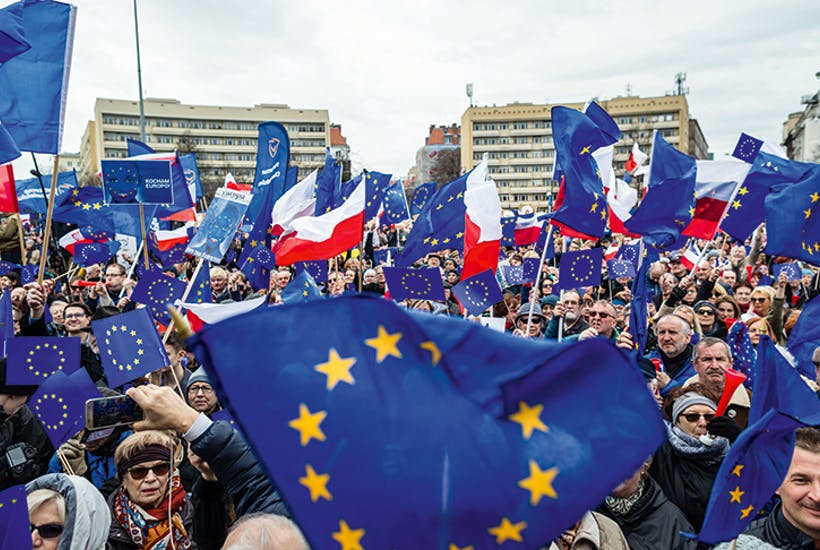‘Just think of America; there’s so much of everything there! And Australia, too,’ said the passenger beside me, a Pole with an impressive white moustache, as we flew east from London. He had laughed when I asked if Brexit keeps him awake at night, with the uncertainty over the future of EU citizens living in Britain. As we flew over sleeping Berlin, this man, who has been working at a London hotel for the past decade, was full of optimism. He had, he said, paid his taxes to HMRC over the years and braved the damp of Victorian-era lodgings. Britain was home now. Forget French cheese and wine; the riches of the Commonwealth await. Things could only get better, he thought, for his family in London and for Britain.
Among Poles in Britain, and here in Warsaw, that kind of exuberance about Brexit is rare. Like others in central Europe, the Polish government fears for its citizens living in Britain, of whom there are 900,000. There are more abstract reasons too, linked to the future of the EU. Poland, which joined in the big eastern enlargement of 2004, isn’t preparing to jump ship. Poles are broadly pro-EU and no major leader is calling for a ‘Polexit’ (yes, that is a word now). The Project 28 poll of 1,000 Poles showed 80 per cent would vote to stay in the EU, compared with an EU average of 64 per cent.
But the right-wing Law and Justice (PiS) party, in power since late 2015, doesn’t like which way the ship, with its Franco-German captains, is sailing. Before the referendum, the Polish government saw London as a key ally in calling for a looser EU, with more power for member states. ‘Sovereignty’ is trending here too; the prime minister used it 20 times in a short speech last year. Some PiS politicians fancy themselves eastern Tories. ‘We are more like the British Tories than Le Pen’s National Front,’ one PiS member of the European Parliament told me after the party came to power. That is debatable, but the idea of the Brits as a safeguard against too much Europe lived on; with Brexit, that has disappeared. In Warsaw, ‘two-speed Europe’, with its connotation of second-class members, has sent shivers down politicians’ spines. With Britain gone, the eurozone is likely to gain importance within the EU. Poland, which has no intention of abandoning the złoty, could be left behind.
For this reason, Warsaw is taking Brexit seriously. The day after the referendum, Jarosław Kaczyński, PiS’s chairman and Poland’s de facto leader, called a press conference. Leaden-faced, he proclaimed something ‘very bad’ had happened. He also denounced plans for a ‘Carolingian Europe’ grouped around the EU’s six founding members: France, Germany, the three Benelux countries and Italy. Kaczyński almost never flies, but in March he flew to London to talk Brexit with Theresa May.
Unlike some of their western European counterparts, Poland’s leaders — and former prime minister Donald Tusk in Brussels — have no desire to punish Britain for leaving. Konrad Szymański, the Europe minister, hopes for smooth negotiations that will result in a deal. Poland’s aim is to ‘create something that will replace membership’ for Britain, he said during a visit to London in May. What that might be, though, is unclear.
Meanwhile, the Polish government needs all the friends it can get. It has fallen foul of the European Commission, which accuses it of undermining the rule of law with its changes to the constitutional tribunal, Poland’s highest constitutional court. The refusal to take in refugees from the Middle East has further antagonised EU officials. Relations with Berlin, cordial when Tusk was in charge, have also cooled under PiS. Instead, Warsaw has sought solace within the Visegrad Group, which also comprises Hungary, the Czech Republic and Slovakia. Kaczyński and Hungary’s prime minister, Viktor Orbán, have become symbols of defiance towards Brussels, though not ones all Brexiteers would want to be associated with. Meanwhile, Warsaw will want to strengthen relations with Britain. It gets lonely on the edge of Europe.
In March, I was invited to a Polish-British brainstorming session in Warsaw, with panels spanning international politics, trade and ‘the new normal’. Over dinner, dignitaries from both countries raised their glasses to a bright Anglo-Polish future. They remembered the Polish pilots who fought in the Battle of Britain and celebrated British-Polish marriages, of which there have been many (my parents included). As the wine flowed, differences were forgotten and the night momentarily became resplendent with the Brexit optimism of my moustachioed fellow passenger.
Annabelle Chapman was the 2016 winner of The Spectator’s Timothy Garton Ash Prize for European writing.






Comments